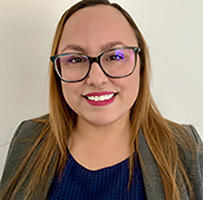Contributing to Precision Oncology by Expanding Basic Research Capacities Using Next-Generation Cancer Models
, by Julyann Pérez-Mayoral, Ph.D.
As a basic cancer researcher, I am interested in ways to expand the capacities of researchers to explore new pathways and treatment options that can lead to acceleration of personalized treatments at the bedside. During my last year of postdoctoral training, I realized I wanted to transition to a position where I could capitalize on my experience in cancer genetics to further the scientific enterprise in a larger setting. Thus, I joined the Human Cancer Models Initiative (HCMI) as a program manager to help lead efforts to enrich the available resources such as next-generation cancer models in personalized medicine.
During my undergraduate studies, I was granted the opportunity to participate in the MARC U*STAR Program at the Pontifical Catholic University of Puerto Rico. It was through this program that I had my first research experience at a NeuroAIDS laboratory. As a Chemistry major, I was excited about this research opportunity since it allowed me to explore other scientific fields such as molecular biology and cell biology. It became the beginning of my strong interest in pursuing a career as a researcher. After graduating in 2006 with a B.S. in Chemistry, I joined the Post-Baccalaureate Research Education Program (PREP) at the University of Rochester. This experience allowed me to develop a bigger research project and fine-tune other skills such as time management, laboratory management and data interpretation. It also prepared me to pursue graduate studies and become a researcher.
After leaving the University of Rochester PREP Program, I returned to Puerto Rico to continue graduate school. I pursued my Ph.D. in Biomedical Sciences at the Ponce School of Medicine and Health Sciences (now Ponce Health Sciences University). My graduate training allowed me to become familiar with the concepts of genetics, cancer biology and population genetics. Furthermore, it allowed me to train in a newly established laboratory where I was able to learn laboratory set-up and fine-tune my organizational and administrative skills. My thesis project focused on DNA repair genes polymorphisms and their association with DNA repair capacity in Puerto Rican women with breast cancer. My research showed that polymorphisms in nucleotide excision repair genes RAD23 homolog B, nucleotide excision repair protein (RAD23B) and DNA damage recognition and repair factor (XPC) had an additive effect on reducing DNA repair capacity and increasing breast cancer risk in Puerto Rican women. Through my doctoral training, I realized the importance of genetic and genomics in studying cancer and reducing cancer health disparities in underserved populations.
Recently, I finished my postdoctoral training at the University of Puerto Rico Comprehensive Cancer Center. It was during my tenure as a postdoctoral fellow that I learned about patient recruitment, collection of clinical data, database maintenance and design, and biospecimen processing for biobanking. My main postdoctoral project focused on the role of genetic ancestry in association with the risk of developing colorectal cancer and colorectal tumor characteristics. Even though we did not find that genetic ancestry was associated with colorectal cancer risk, we found that Puerto Ricans with higher than 18% of African ancestry were at higher risk of developing rectal tumors. This research could serve as a steppingstone for personalized interventions for colorectal cancer in Puerto Ricans. In addition, I worked on projects that focused on characterizing the mutational spectrum and clinical features of hereditary colorectal cancer syndromes in Puerto Ricans. I was also involved in a collaborative project with City of Hope Cancer Center which offered research-based genetic testing and counseling to breast cancer patients whose cancer was suspected to be hereditary based on the age of onset and family history of cancer. This project allowed me to expand my knowledge of hereditary cancer by participating in the Intensive Course in Genomic Cancer Risk Assessment. All of these projects during my postdoctoral training required working with an interdisciplinary team to advance the research and to benefit cancer patients in Puerto Rico.
By joining the HCMI, I will be able to use my skills in cancer genetics, molecular biology and management of research projects. The HCMI has the goal of generating human tumor-derived next-generation cancer models from a wide array of cancer subtypes. The HCMI models are characterized and annotated with clinical, biospecimen and molecular data for the scientific community. In my role as a Scientific Program Manager, I will work to ensure that samples from normal, parent-tumor and cancer model are annotated as much as possible. Furthermore, I will collaborate with the teams at Biospecimen Processing Center (BPC), Genomic Characterization Centers (GCCs) and Genomic Data Commons (GDC) to monitor samples and provide support to identify and overcome potential challenges that may arise. This collaborative work serves to ensure that the objective of HCMI to provide high-quality, characterized and annotated next-generation cancer models to the scientific community is met.
As I begin my role as a Scientific Program Manager for the HCMI, I can’t help but feel excited about the potential of this program to address many big scientific questions within the field of cancer. The HCMI next-generation models recapitulate tumor biology more accurately than traditional models, hence, paving the way for precision oncology. Our understanding of disease modeling, tumor microenvironment, carcinogenesis pathways, genetic changes, drug screening and treatment outcomes, may grow with the availability of these models. I am honored to be part of an initiative like HCMI where I can use my skills to further the scientific knowledge beyond the bench. It is my hope that the collective effort of HCMI to provide next-generation cancer models can positively impact precision oncology efforts that benefit cancer patients.
